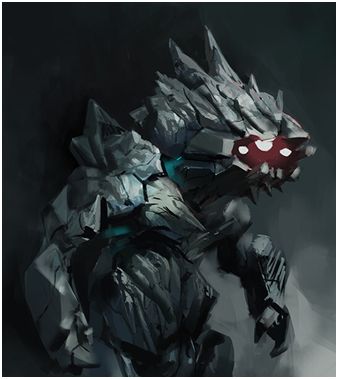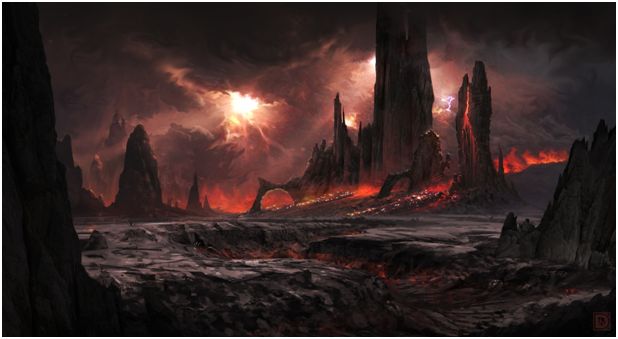Slate

| |
| Slate | |
| Survey Data | |
| Star System: |
Hydrogar |
| Region: | |
| Quadrant: |
Delta |
| Classification: |
Class D |
| Political Information | |
| Affiliation: |
Independent |
| Capital: |
The Spire |
| Political System: |
Democratic Monarchy |
| Population: |
4.2 Billion |
| Biological Information | |
| Type: |
Humanoid |
| Atmosphere type: |
None |
| Development Stage: |
Warp-Capable |
| Character: |
Militaristic |
| Typical Lifespan: |
Typical Lifespan - Effectively Immortal |
| Empathic species: |
No |
| Telepathic species: |
No |
| [ Source ] | |
Contents
Physiology
The Slate are silicon based life, but moreso they are essentially sentient living rocks. They consume mineral worth by contact and integrating it into their physical being. They do not respire, do not require water, or heat, or even feel the difference in atmospheric pressure. They are rocks, given life. Their internal biology is a mystery, as they have several different forms of stone and lithographic structures within their bodies, but they all simply register as stone. Where they manifest their intelligence or their voice from are both equally mysterious. But they do indeed speak, and they do indeed think. Just, very slowly. Slate are born from mineral rich deposits coaxed to life through what are known as memory shards: Unique crystalline growths that occur within every member of the Slate. Through cooperation between anywhere from three to seven Slate, a new memory shard can be forged, possessing only the raw essence of experience, shared from each contributing member. This shard is then brought to the Heart of the World, a shrine to life found on each Slate world. There, the shard is planted within the world and like a crop, the next generation will eventually be born.
If the memory shard can be recovered from a destroyed Slate and returned to the Heart of the World, the Slate can be born again. This process is rumored to take hundreds of years to complete.
Merits and Flaws
-
- Slate are living stone, and as such they have several immunities and resistances simply by not being an organic life form. They do not breath, do not eat as we do, and do not need comforts or amenities as we do. They are immune to biological diseases or conditions, and ignore almost any environmental hazards unless they also would affect or dissolve stone.
- To the opposite of this, they are ponderously slow. Having a rolling stone of a metabolism, they walk slow, speak slow, think slow, react slow, and do everything at half the pace of a human. When they suffer physical injuries that result in a crack in their form, it might take months for that crack to fill. If it shatters off a limb, it might take decades for that limb to begin to grow back. They heal at the same rate that stalactites form.
- Empathic species: No
- Telepathic species: No
Government
The Slate elect a single leader, known as the Shard. That singular ruler then makes their way to the heart of their capitol city and engages in a ritual transfer of rulership that can take upwards of six months. Once this is done, the new Shard has all the knowledge and insight of the previous, and the previous Shard crumbles to dust... Memory shard and all. To become the leader is to know true death at some point in their existence, to be remembered by the next. All Slate vote on the identity of the next Shard, but only the Shard themselves can call for a vote. The record for the fastest moot still stands, from start to finish, at twenty six years.
Society
Slate society is not too dissimilar from carbon based society. Slate enjoy the vibrations of music and song, the slow motions of rhythmic dance, the contrasting colors of various pigment splashes over uniform colors. Though since the ideal Slate colony is an atmosphere-less husk, all it is is vibration, motion, and color. Sports and competitions exist, but are more comparable to competitive Bache Ball or marbles, though the younger crags do engage in the bout of recreational magnetism.
The concept of the Family Unit is interesting to the Slate, as each Slate can be formed from the cooperation of anywhere from three to seven contributors, or what carbon life could call Parents. Slates are ‘born’ knowing who their contributors were, and having a sense of ethics and morals instilled within them from those same. Slate are born knowing their name, and are in full control of their motion and speech centers.
The only thing Slate do quickly is get to work. Once they are born into this world, they are usually seeking a purpose within the next ten to twenty minutes. Slate enjoy periods of rest too, but breaks that last longer then three weeks tend to draw concern.
An oddity about their mindset is their perception of time. The smallest unit of time that a Slate can actually comprehend is the standard Terran Minute. Anything shorter than a Minute in duration is something that the Slate might as well not even comprehend. On the flip side, Slate can easily think in terms of months or even years as casually as a carbon based organism can think of hours or days.
Economy
As a species that consumes precious ore as though it were fine cuisine, the Slate use waste products from their industry as currency for barter or trade. Though, these may or may not be highly radioactive. Not that the Slate would know. To aid in interstellar commerce, the Slate have joined the Dalacari Transplanetary Exchange. The Slate trade in a currency they simply call "shiny", which is actually feldspar, or more commonly known on Earth as 'Fools Gold'. It is the one mineral that Slate find unpalletable, and therefore useless as an internal resource. Shiny is only used to trade with the galactic community. Within their own society, the Slate are downright socialist with their sharing of resources and wealth. For more information, consult the primer on Currencies of the Delta Quadrant
Family
As stated, Slate family concepts are odd compared to other species, but the fact that so many Slate come together to bring a new life into the world means each life is planned, wanted, and cherished. Slate communities become intertwined with familial connections. Entire communities become one big family.
Religion
Slate worship the core of each planet they inhabit, as the core brings mineral wealth to the world. This in turn means food and population for them. The other celestial bodies of the cosmos generally don’t mean as much as the core of the planet they’re currently upon, but this does call for interesting terms. Travelers from other colonies are known as pilgrims, while a colony ship being sent to spread the Slate to a new planet are known as doing the Core’s will.
Language
The Slate communicate with one another through a deep, bass rumble far below the range of normal human hearing. This rumble travels through their body, through the stone and earth at their feet, and then radiating around to any Slate in proximity. Thus the concept of a private conversation is odd to them. They can minimize eavesdropping by placing a hand or other limb on the body of the Slate they wish to converse with, but that just seems rude.
To aid in their capacity to communicate, several of the more industrious races of the Delta quadrant developed a bracer of sorts that can translate their sub-sonic rumblings into audible words and tones. While this form of conversation lacks any and all inflection and tone, it also allows the Slate to be understood. Without this translation bracer, a Slate's conversation is a rumble felt more than understood, and can sometimes play a role as a pleasant massage to most other races.
Food and Entertainment
The Slate are lithovores, consuming precious and semi-precious minerals. They reserve heat and flame for their industry, as there is no need to serve up gold or nickel warm. Due to their slow reaction and motion, Slate entertainment must be presented meticulously, or something might be missed. A fireworks demonstration, for example, might not go over well as most of the Slate present might miss the pops. They’d love the thunderous detonations, though.
Science and Technology
Slate sciences in the fields of metallurgy and mineralology are superb, but their concepts of biospheres or habitations are nonexistent. Since they can survive in just about any environment, they never bothered to research how to live in any environment. Terraforming is a joke to them, as they can survive in any environment from the crushing depths of the ocean floor to the cold vacuum of space. Their starships are less starcraft and more asteroids with engines attached to them, and the deadly radiation of the various systems of their ship is something they can ignore as they explore the cosmos.
As for weaponry, the Slate have weapons that, while not exactly the most damaging in terms of raw power, put off magnitudes of radiation beyond what a normal weapon would produce. As for physical projectiles, the Slate have taken to launching hollowed rocks full of their ship’s reactor waste at their enemies. Their advancements in physical projectiles are astounding, and their linear accelerators are on par with Federation phasers.
The Slate acquired Warp Travel Technology by accident during a presumed first contact event. Their perception of time would normally make it never occur to them to travel faster than light, when their greatest advantage is their agelessness. However, their warp drives are incredibly inefficient and are rated for a maximum velocity of Warp 5.
Military
The Slate have a standing military force on all colonies at all times, and each colony donates a small percent of their own population to serve as the Shard’s personal guard. In addition to their ship board weaponry, the Slate employ high-end beta wave weapons of their own. These weapons have no effect on the Slate, so there’s no harm in ‘friendly fire’ when dealing with upstart carbon life.
Slate involved in active military duty undergo rigorous training to sharpen their minds to the point that they recognize that there's a unit of time shorter than a minute. Whatever it is, they don't like to think about it, and only truly do so in dangerous circumstances.



